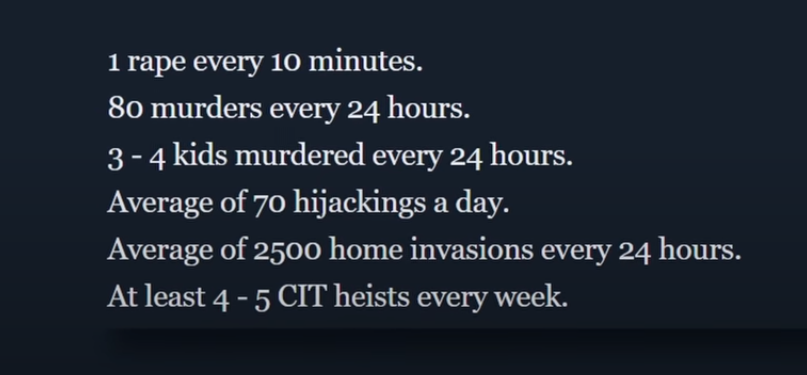The Western world appears to be apprehensive of the political and economic axis commonly known as BRICS i.e. the loose union of Brasilia, Russia, India, China and South Africa, all the more so because a number of other nations have expressed their willingness to join these five in an effort to contribute to the creation of an alternative world to that run by the United States and its vassals: the United Kingdom, Australia, New Zealand and the European Union. As the old wisdom says, the chain is as strong as its weakest link. Which is the weakest link in BRICS? Yes, you guessed it right: the Republic of South Africa.
As is known, the country has been run by its black majority (the African National Congress or ANC, to be precise) for three decades now and within this time its economy, the schooling system, societal cohesion and the basic infrastructure has been constantly collapsing. South Africa is notorious for rampant petty and violent crime, and for its power outages. Power outages lead to a string of other problems, since modern civilization is based on electricity. Why is South Africa on a slippery road to a collapse? Why is South Africa disintegrating? Why is South Africa about to become a failed state?
Various explanations have been advanced recently. Of these, the objective economic crises outside the country, the split of South African society along racial, class, tribal and sectarian divides, natural disasters that haunted the country, and ultimately the Marxist principles of equity that have been enforced are most frequently discussed. The experts, journalists or politicians who come up with these explanations seem not to notice the elephant in the room. Before 1994, when South Africa was ruled by the white minority and abided by the laws of apartheid, it faced the same problems: racial, class, tribal and sectarian divisions, objective, external economic crises, periodic natural disasters and the like, and yet, and despite these factors it was Africa’s top nation in terms of economy. What has changed since 1994?
Well, Marxism as the ruling political principle is one of the factors. Countries following Marxism in economy did not fare well anywhere in the world: think about the socialist countries of Eastern Europe, think about the Soviet Union, Maoist China or Cuba. Yet, in none of them did we observe power outages, in none of them did we see rampant theft of the elements of basic infrastructure; none of them was fraught with crime and none of them descended into lawlessness the way South Africa has done. Obviously, we need to look for another explanation. What else has changed since 1994?
Ah, yes! Pluck up your intellectual courage and own it up: South Africa has been ruled by its black majority. Now draw a comparison between the quality of life in black neighbourhoods in the United States or Europe and that in South Africa and you will spot a striking resemblance. That’s a fact of life, no more, no less. Some of the former communist countries were in very deep economic problems: in some of them almost all sorts of food! were rationed, and yet there was no trash in the streets, no theft of the items of infrastructure, no violent riots in the streets with torched cars and smashed shop windows, and no rampant petty or violent crime.
The reasonable, scientific approach dictates to us an impartial analysis of the factors that are in play. The Chinese and some of the European nations followed Marxist principles in economy and they did not have all the glaringly, blatantly negative phenomena that we are observing in South Africa. Conversely, there was no Marxism in the United States, and black communities behave the way they do in South Africa, and black neighbourhoods look pretty much like their counterparts in South Africa. Is there a significant difference between majority-black Chicago and majority-black Johannesburg? Why not see the elephant in the room?

South Africa: crime statistics. Source: It’s True – South Africa Is Collapsing – Morning Shot.



